Chentao Yue
Medical Referring Image Segmentation via Next-Token Mask Prediction
Nov 07, 2025Abstract:Medical Referring Image Segmentation (MRIS) involves segmenting target regions in medical images based on natural language descriptions. While achieving promising results, recent approaches usually involve complex design of multimodal fusion or multi-stage decoders. In this work, we propose NTP-MRISeg, a novel framework that reformulates MRIS as an autoregressive next-token prediction task over a unified multimodal sequence of tokenized image, text, and mask representations. This formulation streamlines model design by eliminating the need for modality-specific fusion and external segmentation models, supports a unified architecture for end-to-end training. It also enables the use of pretrained tokenizers from emerging large-scale multimodal models, enhancing generalization and adaptability. More importantly, to address challenges under this formulation-such as exposure bias, long-tail token distributions, and fine-grained lesion edges-we propose three novel strategies: (1) a Next-k Token Prediction (NkTP) scheme to reduce cumulative prediction errors, (2) Token-level Contrastive Learning (TCL) to enhance boundary sensitivity and mitigate long-tail distribution effects, and (3) a memory-based Hard Error Token (HET) optimization strategy that emphasizes difficult tokens during training. Extensive experiments on the QaTa-COV19 and MosMedData+ datasets demonstrate that NTP-MRISeg achieves new state-of-the-art performance, offering a streamlined and effective alternative to traditional MRIS pipelines.
Short Wins Long: Short Codes with Language Model Semantic Correction Outperform Long Codes
May 13, 2025Abstract:This paper presents a novel semantic-enhanced decoding scheme for transmitting natural language sentences with multiple short block codes over noisy wireless channels. After ASCII source coding, the natural language sentence message is divided into segments, where each is encoded with short block channel codes independently before transmission. At the receiver, each short block of codewords is decoded in parallel, followed by a semantic error correction (SEC) model to reconstruct corrupted segments semantically. We design and train the SEC model based on Bidirectional and Auto-Regressive Transformers (BART). Simulations demonstrate that the proposed scheme can significantly outperform encoding the sentence with one conventional long LDPC code, in terms of block error rate (BLER), semantic metrics, and decoding latency. Finally, we proposed a semantic hybrid automatic repeat request (HARQ) scheme to further enhance the error performance, which selectively requests retransmission depends on semantic uncertainty.
GNN-based Auto-Encoder for Short Linear Block Codes: A DRL Approach
Dec 03, 2024
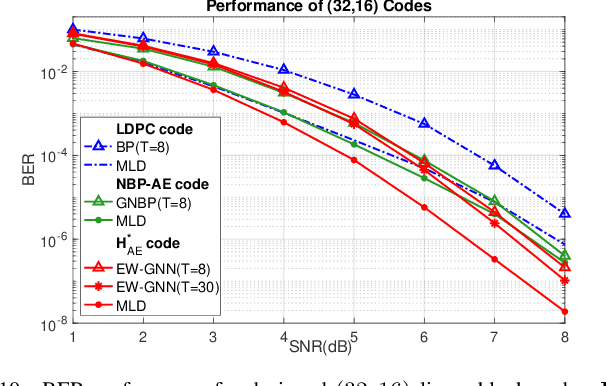
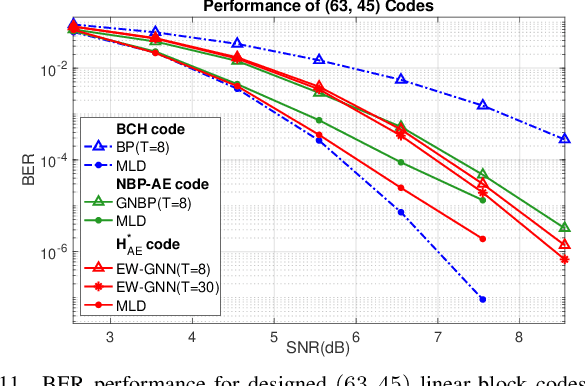
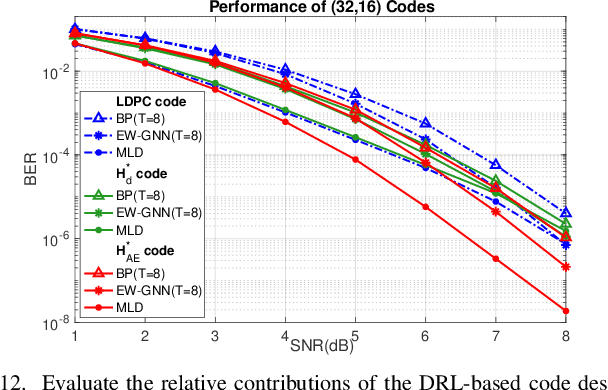
Abstract:This paper presents a novel auto-encoder based end-to-end channel encoding and decoding. It integrates deep reinforcement learning (DRL) and graph neural networks (GNN) in code design by modeling the generation of code parity-check matrices as a Markov Decision Process (MDP), to optimize key coding performance metrics such as error-rates and code algebraic properties. An edge-weighted GNN (EW-GNN) decoder is proposed, which operates on the Tanner graph with an iterative message-passing structure. Once trained on a single linear block code, the EW-GNN decoder can be directly used to decode other linear block codes of different code lengths and code rates. An iterative joint training of the DRL-based code designer and the EW-GNN decoder is performed to optimize the end-end encoding and decoding process. Simulation results show the proposed auto-encoder significantly surpasses several traditional coding schemes at short block lengths, including low-density parity-check (LDPC) codes with the belief propagation (BP) decoding and the maximum-likelihood decoding (MLD), and BCH with BP decoding, offering superior error-correction capabilities while maintaining low decoding complexity.
A Scalable Graph Neural Network Decoder for Short Block Codes
Nov 13, 2022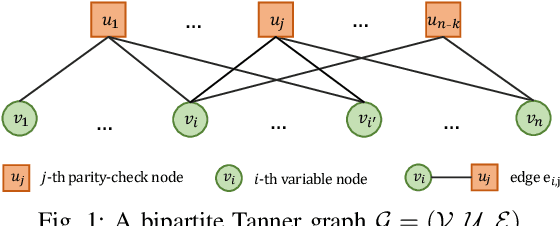
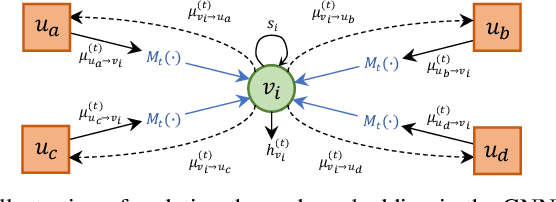
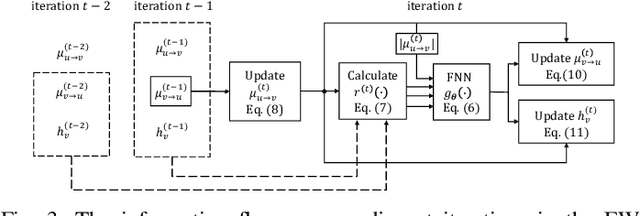

Abstract:In this work, we propose a novel decoding algorithm for short block codes based on an edge-weighted graph neural network (EW-GNN). The EW-GNN decoder operates on the Tanner graph with an iterative message-passing structure, which algorithmically aligns with the conventional belief propagation (BP) decoding method. In each iteration, the "weight" on the message passed along each edge is obtained from a fully connected neural network that has the reliability information from nodes/edges as its input. Compared to existing deep-learning-based decoding schemes, the EW-GNN decoder is characterised by its scalability, meaning that 1) the number of trainable parameters is independent of the codeword length, and 2) an EW-GNN decoder trained with shorter/simple codes can be directly used for longer/sophisticated codes of different code rates. Furthermore, simulation results show that the EW-GNN decoder outperforms the BP and deep-learning-based BP methods from the literature in terms of the decoding error rate.
Bayesian Neural Network Detector for an Orthogonal Time Frequency Space Modulation
Jun 27, 2022



Abstract:The orthogonal time-frequency space (OTFS) modulation is proposed for beyond 5G wireless systems to deal with high mobility communications. The existing low complexity OTFS detectors exhibit poor performance in rich scattering environments where there are a large number of moving reflectors that reflect the transmitted signal towards the receiver. In this paper, we propose an OTFS detector, referred to as the BPICNet OTFS detector that integrates NN, Bayesian inference, and parallel interference cancellation concepts. Simulation results show that the proposed OTFS detector significantly outperforms the state-of-the-art.
 Add to Chrome
Add to Chrome Add to Firefox
Add to Firefox Add to Edge
Add to Edge